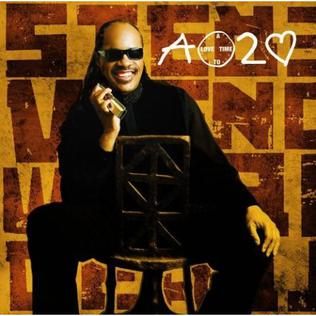
A Time to Love is the twenty-third studio album by Stevie Wonder, his first since Conversation Peace in 1995. Originally to have been completed in 2004, it was finally released to stores on October 18, 2005, following an exclusive digital release on Apple's iTunes Music Store on September 27.

Diamonds & Rust is the sixteenth studio album by American singer-songwriter Joan Baez, released in 1975. The album covered songs written or played by Bob Dylan, Stevie Wonder, The Allman Brothers, Jackson Browne and John Prine. Diamonds & Rust, however, also contains a number of her own compositions, including the title track, a distinctive song written about Bob Dylan, which has been covered by various other artists.

Greatest Hits is Phil Ochs' seventh album and final studio album released in his lifetime, released in 1970 on A&M Records. Contrary to its title, it offered ten new tracks of material, mostly produced by Van Dyke Parks.
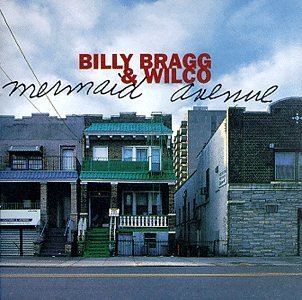
Mermaid Avenue is a 1998 album of previously unheard lyrics written by American folk singer Woody Guthrie, put to music written and performed by British singer Billy Bragg and the American band Wilco. The project was the first of several such projects organized by Guthrie's daughter, Nora Guthrie, original director of the Woody Guthrie Foundation and archives. Mermaid Avenue was released on the Elektra Records label on June 23, 1998. A second volume of recordings, Mermaid Avenue Vol. II, followed in 2000 and both were collected in a box set alongside volume three in 2012 as Mermaid Avenue: The Complete Sessions. The projects are named after the song "Mermaid's Avenue", written by Guthrie. This was also the name of the street in Coney Island, New York, on which Guthrie lived. According to American Songwriter Magazine, "The Mermaid Avenue project is essential for showing that Woody Guthrie could illuminate what was going on inside of him as well as he could detail the plight of his fellow man". It was voted number 939 in Colin Larkin's All Time Top 1000 Albums 3rd Edition (2000).

Mermaid Avenue Vol. II is a 2000 album of previously unheard lyrics written by American folk singer Woody Guthrie, put to music written and performed by British singer Billy Bragg and American band Wilco. It continues the project originally conceived by Guthrie's daughter, Nora Guthrie which resulted in the release of Mermaid Avenue in 1998. Both volumes were collected in a 2012 box set along with volume three as Mermaid Avenue: The Complete Sessions.

Alice's Restaurant is the debut studio album by Arlo Guthrie released in October 1967 by Reprise Records. It features one of his most famous songs, "Alice's Restaurant Massacree". A steady seller, the album peaked at No. 17 on the Billboard Top LPs chart in March 1968. The album re-entered the chart in October 1969 and reached No. 63 in November of that year. Alice's Restaurant went gold in September 1969 and Platinum in October 1986.
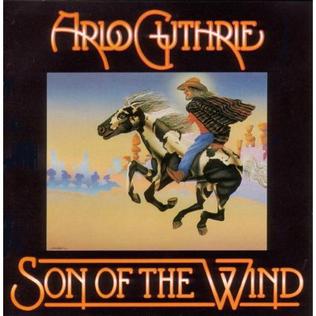
Son of the Wind is an album by the American folk singer Arlo Guthrie, released in 1992. It is an album of cowboy songs recorded with Guthrie's band, Shenandoah. Guthrie had wanted to make such an album since he was a child.

Running Down the Road is the second studio album by American folk singer Arlo Guthrie. Guthrie's version of the traditional folk tune "Stealin'" was featured in the film Two-Lane Blacktop. The cover shows the artist upon a Triumph TR6 Trophy motorcycle which is also pictured in the album's 'gate'. Clarence White and Gene Parsons from the then current lineup of The Byrds played on some tracks.

Hobo's Lullaby is an album by the American folk singer Arlo Guthrie. It was released in 1972 on Reprise Records. It was re-released on Rising Son Records in 1997. The album contains Guthrie's only Top 40 hit, a cover of Steve Goodman's "City of New Orleans".

Washington County is a 1970 album by the American folk singer Arlo Guthrie. It peaked at #33 on the Billboard charts on December 4, 1970, and number 28 in Australia.

Swing Set is an EP by Ani Difranco, released July 11, 2000 on Righteous Babe Records.

Into the Purple Valley is the second studio album by roots rock musician Ry Cooder, released in 1972.

The Best of Arlo Guthrie is a 1977 compilation album by Arlo Guthrie.

Last of the Brooklyn Cowboys is a 1973 album by the American singer-songwriter Arlo Guthrie. The title was borrowed from a nickname given to Ramblin' Jack Elliott. Although not intended as a concept album, Guthrie recorded it with the goal of evoking a particular, "mythical" place and era, which he also intended to embody in the cover art.
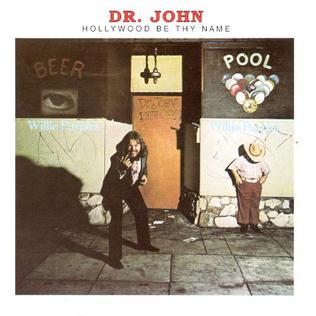
Hollywood Be Thy Name is a live album by New Orleans R&B artist Dr. John. It was produced by producer Bob Ezrin. The recording venue, Willie Purple's Niteclub, was in reality Cherokee Recording Studios with a live audience.

Ry Cooder is the debut album by roots rock musician Ry Cooder, released in 1970.
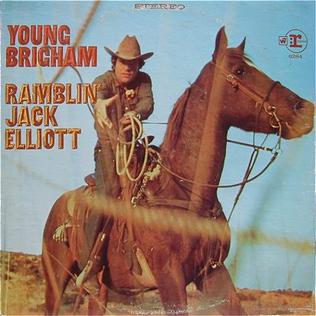
Young Brigham is an album by American folk musician Ramblin' Jack Elliott, released in 1968.

Amigo is a 1976 album by Arlo Guthrie. It is his seventh studio album. The album peaked at No. 133 on the Billboard 200.

Occupy This Album: 99 Songs for the 99 Percent is a four-disc compilation box set released in May 2012 through the record label Music for Occupy. The album concept, and initial production was initiated by Executive Producer Jason Samel. Jason Samel later recruited Producers Maegan Hayward, Alex Emanuel and Shirley Menard to assist with the project. The set consists of 99 songs inspired by or related to the Occupy movement. Proceeds from the album went "directly towards the needs of sustaining this growing movement."

Outlasting the Blues is the tenth studio album by American singer-songwriter Arlo Guthrie, released in June 1979 by Warner Bros. Records. Produced by John Pilla and recorded from January to March 1979 with Guthrie's touring band Shenandoah, the album consists of songs about mortality, spirituality, love, and the passing of time.




















